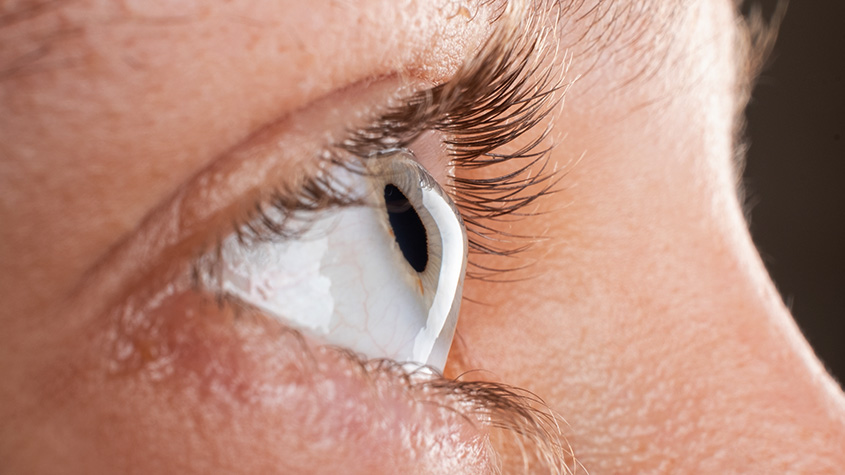
What Is Keratoconus?
Keratoconus is a progressive eye condition that causes the cornea — the clear, domeshaped surface at the front of your eye — to thin and gradually bulge outward into a cone shape. This distortion prevents light from focusing correctly on the retina, resulting in blurry, distorted, or fluctuating vision that glasses alone often can’t correct.
Common signs and symptoms include:
- Frequent changes in glasses or contact lens prescriptions
- Blurred or ghosted vision
- Increased light sensitivity or glare
- Poor night vision
- Eye strain or discomfort
Keratoconus typically develops during the teenage years or early adulthood and can worsen over time. Early diagnosis and management are key to preserving your vision.

Corneal Cross-Linking: The First Step in Protecting Your Vision
Corneal Cross-Linking (CXL) is an advanced, FDA-approved treatment that helps stop or slow the progression of keratoconus. It works by strengthening the collagen fibers in the cornea to make it more stable and less likely to change shape
How it works:
During the procedure, vitamin B2 (riboflavin) eye drops are applied to the cornea. Then, a controlled ultraviolet (UV) light is used to activate the riboflavin, forming new cross-links between the corneal fibers. This process reinforces the cornea, much like adding rebar to concrete.
Benefits of Corneal Cross-Linking:
- Proven to halt keratoconus progression
- Helps preserve vision and prevent further thinning
- Minimally invasive, in-office procedure
- Reduces the likelihood of needing a corneal transplant in the future

Our Approach at North Texas Ophthalmology Associates
At North Texas Ophthalmology Associates, our cornea specialists use the latest diagnostic imaging to detect keratoconus early and create personalized treatment plans for each patient. We combine cutting-edge technology with compassionate care to help you maintain the best possible vision.
Your evaluation may include:
- Corneal mapping and topography
- Comprehensive eye exam
- Discussion of all treatment options, including corneal cross-linking and specialty contact lenses
Our team provides long-term follow-up care to ensure your corneas remain healthy and stable over time.
Is Corneal Cross-Linking Right for You?
If you’ve recently been diagnosed with keratoconus, or your vision seems to be changing more often than usual, schedule a consultation with our ophthalmology team. Crosslinking is most effective when performed in the early to moderate stages of keratoconus.
Schedule Your Keratoconus Consultation in Wichita Falls
Don’t wait until your vision worsens — early intervention makes all the difference. Call North Texas Ophthalmology Associates 940.240.8400 to learn more about keratoconus diagnosis and corneal cross-linking treatment in Wichita Falls and North Texas.
Frequently Asked Questions About Keratoconus and Corneal Cross-Linking
Patients across Wichita Falls and North Texas often have questions about keratoconus and corneal cross-linking. Here are clear, helpful answers from the team at North Texas Ophthalmology Associates to guide you through your options and next steps.
The exact cause isn’t fully understood, but keratoconus is linked to a combination of genetic, environmental, and behavioral factors. It’s more common in people with a family history of the condition, frequent eye rubbing, or certain allergies or connective tissue disorders.
Keratoconus cannot be “cured,” but treatments like corneal cross-linking can stop or slow its progression. Specialty contact lenses, such as scleral or hybrid lenses, can also help correct vision and improve comfort.
Without treatment, keratoconus can worsen over time, leading to significant vision distortion and, in advanced cases, scarring or corneal thinning that may require a corneal transplant. Early diagnosis and treatment are key to preserving vision.
The procedure is typically well-tolerated. Numbing drops are used to ensure comfort, and most patients describe a mild gritty or burning sensation for a few days afterward. Your doctor will provide medicated drops and instructions to help your eye heal smoothly.
Most patients can return to normal activities within a few days. Vision may be blurry at first, but it gradually improves over several weeks as the cornea stabilizes and heals. Regular follow-up appointments are important to monitor progress.
Cross-linking is designed primarily to stabilize your vision, not necessarily to improve it. However, some patients do notice mild improvements as the cornea becomes stronger and more regular in shape over time.
Yes. If both eyes are affected, treatment can be performed on one eye at a time, usually spaced a few weeks apart, depending on your doctor’s recommendation.
Coverage can vary by provider and plan, so it’s best to check with your insurance company to confirm your specific benefits. Our team is always available to answer questions and help you understand your options.
If you’ve been diagnosed with progressive keratoconus or have noticed frequent prescription changes, you may be a good candidate. Schedule an evaluation with our ophthalmology team to determine if cross-linking is right for you.
To schedule an appointment, please call our Wichita Falls office. Our friendly team will help you find a convenient time for your keratoconus evaluation and answer any questions you may have.
North Texas Ophthalmology Associates proudly offers FDA-approved corneal cross-linking in Wichita Falls, TX. Our experienced ophthalmologists provide advanced keratoconus treatment using state-of-the-art diagnostic and surgical technology.
Yes. Patients from throughout North Texas — including Wichita Falls, Burkburnett, Vernon, and surrounding areas — trust our team for expert diagnosis and treatment of keratoconus. We’re dedicated to helping every patient preserve and protect their vision close to home.
Ready to Schedule Your Appointment?
If you’re experiencing vision changes or have been diagnosed with keratoconus, we’re here to help. Call us today at 940.240.8400 to schedule your evaluation with North Texas Ophthalmology Associates in Wichita Falls, TX








